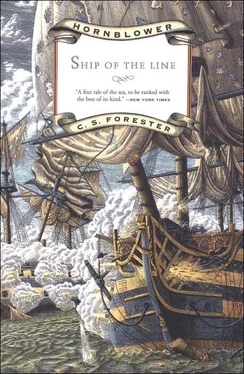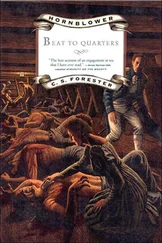“There’s a lot of small craft, sir, at anchor round the point, there. I can just see ‘em from here, sir.”
A dark speck danced in the object glass of Hornblower’s telescope. He lowered the instrument to rest his aching eye, and then he raised it again. The speck was still there; it was a tricolour flag waving lazily in the wind from a flagstaff on the point. That was what Hornblower had been seeking. A French battery perched on the top of the cliff. Forty-two pounders, probably, sited with a good command, probably with furnaces for heating the shot—no ship that floated could fight them. Clustered underneath, a little coasting fleet, huddling there for shelter at the sight of a strange sail.
“Tell your men to lie down,” said Hornblower to Morris. He did not want the red coats of the marines drawn up on the quarterdeck to reveal his ship prematurely for what she was.
The Sutherland crept along, the grey cliffs growing more clearly defined as at Hornblower’s order she was edged closer in shore. Beyond the cliffs mountain peaks were revealing themselves with startling suddenness whenever Hornblower’s rigid concentration on the battery relaxed. He could see the parapets now in his glass, and he almost thought he could see the big guns peeping over them. At any moment now the battery might burst into thunder and flame and smoke, and in that case he would have to turn and fly, baffled. They were well within gunshot now. Perhaps the French had guessed the Sutherland’s identity, and were merely waiting to have her well within range. Every minute that the Sutherland approached meant another minute under fire when she tried to escape. The loss of a mast might mean in the end the loss of the ship.
“Mr. Vincent,” said Hornblower, without shifting his gaze from the battery. “Hoist MV.”
The words sent a stir through the group of officers. They could be certain now of what plan Hornblower had in mind. The trick increased the risk of detection at the same time as, if it were successful, it gave them more opportunity of approaching the battery. If MV were the French recognition signal, and was being correctly employed, well and good. If not—the battery would soon tell them so. Hornblower, his heart thumping in his breast, judged that at any rate it might confuse the issue for the officer in the battery and induce him to delay a little longer. The signal rose up the halliards, and the battery still stayed silent. Now a signal hoist soared up the battery’s flagstaff.
“I can’t read that, sir,” said Vincent. “One of ‘em’s a swallowtail we don’t use.”
But the mere fact of the battery’s signalling in reply meant that they were at least doubtful of the Sutherland’s identity—unless it were part of the plan to lure her closer in. Yet if the battery delayed much longer it would be too late.
“Mr. Bush, do you see the battery?”
“Yes, sir.”
“You will take the long boat. Mr. Rayner will take the launch, and you will land and storm the battery.”
“Aye aye, sir.”
“I will give you the word when to hoist out.”
“Aye aye, sir.”
“Quarter less eight,” droned the leadsman—Hornblower had listened to each cast subconsciously; now that the water was shoaling he was compelled to give half his attention up to the leadsman’s cries while still scrutinising the battery. A bare quarter of a mile from it now; it was time to strike.
“Very good, Mr. Bush. You can go now.”
“Aye aye, sir.”
“Back the main tops’l, Mr. Gerard.”
At Bush’s orders the dormant ship sprang to life. The shrilling of the pipes brought the boats’ crews to the falls at the run. This was the time when the painful drill would reveal its worth; the more quickly those boats were swung out, manned, and away, the less would be the danger and the greater the chance of success. Long boat and launch dropped to the water, the hands swarming down the falls.
“Throw the guns down the cliff, Mr. Bush. Wreck the battery if you can. But don’t stay a moment longer than necessary.”
“Aye aye, sir.”
They were off, the men tugging like maniacs at the oars.
“Helm a-lee! Mr. Gerard, put the ship about. And down with that flag, and send up our own. Ah!”
The air was torn with the passage of cannon shot overhead. The whole ship shook as something struck her a tremendous blow forward. Hornblower saw the smoke billow up round the battery—it had opened fire at last. And thank God it was firing at the ship; if one of those shots hit a boat he would be in a pretty scrape. So pleased was he at the thought that it never occurred to him to wonder about his own personal safety.
“Mr. Gerard, see if the guns can reach the battery. See that every shot is properly aimed. It is no use unless the embrasures can be swept.”
Another salvo from the battery, and too high again, the shot howling overhead. Little Longley, strutting the quarterdeck with his dirk at his hip, checked in his stride to duck, instinctively, and then, with a side glance at his captain, walked on with his neck as stiff as a ramrod. Hornblower grinned.
“Mr. Longley, have that main top gallant halliard spliced at once.”
It was a kindness to keep the boy busy so that he would have no time to be afraid. Now the Sutherland’s starboard broadside began to open fire, irregularly, as the gun captains fancied their weapons bore. Flying jets of dust from the face of the cliff showed that most of the shot were hitting thirty feet too low. But if even one or two shots got in through the embrasures and killed someone working the guns it would be a valuable help in unsettling the artillery men. Another salvo. This time they had fired at the boats. The launch almost vanished under the jets of water flung up by the plunging fire, and Hornblower gulped with anxiety. But the next moment the launch reappeared, limping along crabwise—a shot must have smashed some of the oars on one side. But the boats were safe now; close up to the cliffs as they were the guns up above could surely not be depressed sufficiently to hit them. The long boat was in the very surf now, with the launch at her heels. Now the men were tumbling out and splashing up to the beach.
For a moment Hornblower wished that, contrary to etiquette he had taken command of the landing party, fearing lest a disorderly and piecemeal attack should waste all the advantages gained. No, Bush was safe enough. He could see him through his glass, leaping up on to the road and then turning to face the landing party. Hornblower could see Bush’s arms wave as he gave his orders. Someone led off a party of seamen to the right—that was Rayner, for Hornblower’s straining eyes could perceive his bald head and unmistakable round shouldered gait. Morris was taking the marines—a solid block of scarlet—off to the left. Bush was forming up the remainder in the centre—Bush was clearheaded enough. There were three gullies in the face of the cliff, marked with straggling greenery, and indicating the easiest points of ascent. As the flanking parties reached the bottom of their paths, Hornblower saw Bush’s sword flash as he called his men on. They were breasting the cliffs now, all three parties simultaneously. A tiny faint cheer crept out over the water to the ship.
One or two of the main deck guns were making better practice now. Twice Hornblower thought he saw earth flying from the embrasures as shots struck them; so much the better, but the firing must stop now that the men were mounting the cliff. He pealed on his whistle and bellowed the order. In dead silence the ship slid on through the water while every eye watched the landing party. They were pouring over the top now. Sudden gusts of smoke showed that the guns were firing again—canister or grape, probably. Any of those parties caught in a whirlpool of canister from a forty-two pounder might well be wiped out. Weapons were sparkling on the parapet; little pinpricks of smoke indicated small arm fire. Now out on the left the red coats of the marines were on the very top of the parapet, a white clad sailor was waving from the centre. They were pouring over, although red dots and white dots littered the face of the parapet to mark where men had fallen. One anxious minute with nothing to see seemed to last for hours. And then the tricolour flag came slowly down its staff, and the hands on the main deck burst into a storm of cheering. Hornblower shut his glass with a snap.
Читать дальше









